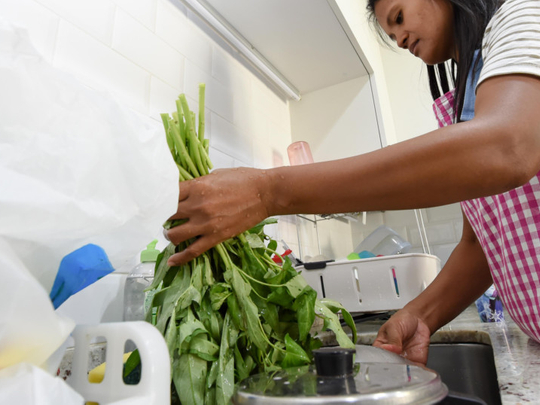
Abu Dhabi: Homemakers and housemaids in the emirate will soon have an opportunity to get a formal training on food safety by paying a nominal fee.
The Abu Dhabi Food Control Authority (ADFCA) will offer a one-day training programme in cooperation with private training institutions to ensure food safety at homes, a senior official told Gulf News.
Food safety: Here's your guide for a model kitchen
Abu Dhabi Ramadan food safety campaign
“It will be an optional training programme and not mandatory at all,” Thamer Al Qasimi, director of Communications and Community Services Department at ADFCA, said in an interview.
The initiative is in response to many enquiries the authority received from homemakers, he said.
“Most of them wanted to train their housemaids and some of them wanted training for themselves.” Therefore, he said, the authority has decided to extend an ongoing programme ‘the Essential Food Safety Training programme (EFST)’ [for food handlers] to homemakers and housemaids.
The programme will be launched after Ramadan and all related details such as fee, names and contact details of private institutions offering the training etc will be announced beforehand, Al Qasimi said.
When asked about the fee to charged for the training programme, he said: “It will be nominal.”
As the successful trainees get a certificate, it will help housemaids in their career. “They are coming from different countries … most of them are uneducated. This will be a golden opportunity for them to get a formal training and certification,” the official said.
The authority has already trained more than 264,000 food handlers working in food businesses across the emirate under the EFST since 2008. This has helped improve the food safety standards considerably and the number of violations has been falling down over the years, he said.
“The number of violations in 2017 went down by 19 per cent, compared to 2016,” Al Qasimi said.
The food safety related incidents at homes have also gone down over the years, he said, although figures were not readily available with him as other government departments are involved in handling food poisoning cases at homes.
“Our continuous awareness campaigns targeting homemakers have played a big role in reducing the incidents,” the official said.
He said the training programme for homemakers and housemaids will further enhance the food safety standards in the emirate.
Food handlers
Over 264,000 food handlers trained since 2008
19% fall in violations in 2017, compared to 2016
Essential Food Safety Training (EFST)
Essential Food Safety Training (EFST) is a programme developed by the Abu Dhabi Food Control Authority. The EFST course includes four essential pillars for safe food handling: how to avoid cross contamination, and how to cook, clean and chill the food safely.
It has been implemented in a phased and incremental manner since 2008, targeting all food handlers involved in the food chain: preparation, processing, cooking, packaging, storage, transportation, distribution, selling and service of food or donating food.
Although training materials are available only in Arabic, English, Hindi and Urdu, the trainers are capable of conducting the programme in several other languages. The authority also developed the first internationally recognised pictorial food safety examination based on photographs. The same training programme will be extended to homemakers and housemaids.








